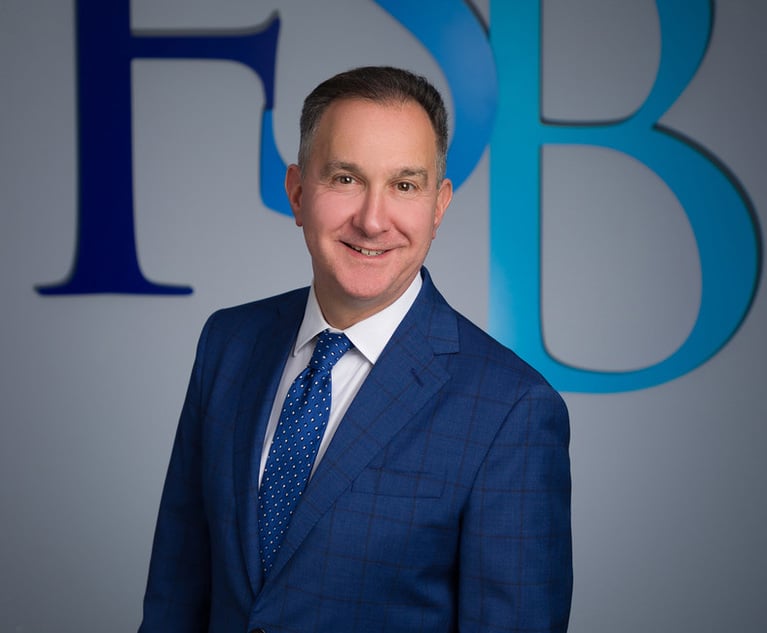 N.J. Gov. Phil Murphy speaking at his inauguration. Photo by Carmen Natale.
N.J. Gov. Phil Murphy speaking at his inauguration. Photo by Carmen Natale.New Law Sets Liability Standard for Public Entities in Sex Assault Cases
The so-called cleanup bill that establishes liability standards in sexual abuse lawsuits filed against public entities and public employees was signed into law on Friday. The legislation was a companion bill that eases time bars on certain civil suits alleging sexual offenses.
August 09, 2019 at 04:56 PM
4 minute read
The so-called cleanup bill that establishes liability standards in sexual abuse lawsuits filed against public entities and public employees was signed into law on Aug. 9 by Gov. Phil Murphy.
The legislation was a companion bill to S-477, which Gov. Phil Murphy signed into law in May to ease time bars on certain civil suits alleging sexual offenses.
The cleanup legislation—A-5392 in the Assembly and S-4749 in the Senate—was one of 21 bills that Murphy signed into law on Aug. 9.
It will amend the state Tort Claims Act and provide for liability standards in sexual abuse lawsuits filed against public entities and public employees that are identical to standards concerning civil suits against nonprofit entities set forth in the Charitable Immunity Act.
“This particular law will apply to public entities and employees,” Sen. Joseph Vitale, D-Middlesex, the prime sponsor with Sen. Nicholas Scutari, chairman of the Senate Judiciary Committee, said in a phone call. “Any employee or any volunteer and any entities that had a hand in the abuse of children will be held accountable.
“My only sense of happiness are for the survivors and victims of abuse,” Vitale said. “This is about them.”
Under the new law, the TCA will provide that: “Any immunity from civil liability granted to a public entity … or public employee shall not apply to an action at law claiming that a willful, wanton or grossly negligent act of a public entity or public employee resulted in a sexual assault, any other crime of a sexual nature, a prohibited sexual act as defined in section 2 of P.L.1992, c.7 (C.2A:61B-1) being committed against a person.”
It will also provide: “Any immunity from civil liability granted to a public entity shall not apply to an action at law claiming that the negligent hiring, supervision, or retention of any public employee resulted in a sexual assault, any other crime of a sexual nature, a prohibited sexual act as defined in section 2 of P.L.1992 , c.7 (C.2A:30B-2) or sexual abuse as defined in section 1 of P.L.1992, c.109 (C.2A:61B-1) being committed against a minor under the age of 18.”
The Senate measure, before passing the committee, was amended to say specifically that immunity provided by the TCA isn’t applicable in cases of willful, wanton or reckless conduct, or negligent hiring or supervision. And “thus any available immunity from some other source of law could be raised by public entities and public employees as a defense to any such lawsuits,” the amended bill’s statement says.
The amended measure passed the Senate Judiciary Committee in June after receiving approval from the counterpart Assembly committee in May. It was approved in floor votes in both chambers in June.
Sponsors call it “the cleanup piece” to S-477. It was legislation the governor specifically requested. Murphy, when signing S-477, pointed out that the phrasing ”a public entity is liable” for sexual misconduct provided for no standard of proof and potentially exposed such entities to expanded liability.
S-3749/A-5392 is to take effect on Dec. 1, 2019, the same effective date as the new statute of limitations bill.
The signing of S-477 by the governor on May 13 significantly extends the statute of limitations for sexual abuse claims in various ways, including by creating a two-year filing window for sexual abuse claims that would otherwise be time-barred by the statute of limitations that goes into effect on the bill’s enactment on Dec. 1.
“[The legislation] will extend the statute of limitations for civil actions by a child or adult victim and will give them the critical time they may need to get necessary healthcare treatment, medically, emotionally or mentally,” said Assemblywoman Carol Murphy, D-Burlington, a sponsor of the main bill signed earlier this year, in an email. “This is incredibly important for victims of sexual assault as the trauma of an assault can make it difficult for victims to come to [the] realization of the assault, understand the assault, seek treatment or come forward and pursue legal action against their attackers. I’m proud to be a co-prime sponsor of this legislation that ensures that the victim has the tools they need to heal and pursue their legal right.”
This content has been archived. It is available through our partners, LexisNexis® and Bloomberg Law.
To view this content, please continue to their sites.
Not a Lexis Subscriber?
Subscribe Now
Not a Bloomberg Law Subscriber?
Subscribe Now
NOT FOR REPRINT
© 2024 ALM Global, LLC, All Rights Reserved. Request academic re-use from www.copyright.com. All other uses, submit a request to [email protected]. For more information visit Asset & Logo Licensing.
You Might Like
View All


Hit by Mail Truck: Man Agrees to $1.85M Settlement for Spinal Injuries
Trending Stories
- 1Decision of the Day: Sri Lanka Granted Stay of Litigation Over Defaulted Sovereign Bond Debt
- 2AI Adoption, Data Center Building Boom Opening More Doors for Cybercriminals, Many of Them Teenagers
- 3Mayor's Advisory Committee To Hold Hearing on Fitness of Judicial Candidates
- 4Are New York City Housing Providers Ready for the Fair Chance for Housing Act?
- 5Litigator of the (Past) Week Runners-Up and Shout-Outs
Who Got The Work
Michael G. Bongiorno, Andrew Scott Dulberg and Elizabeth E. Driscoll from Wilmer Cutler Pickering Hale and Dorr have stepped in to represent Symbotic Inc., an A.I.-enabled technology platform that focuses on increasing supply chain efficiency, and other defendants in a pending shareholder derivative lawsuit. The case, filed Oct. 2 in Massachusetts District Court by the Brown Law Firm on behalf of Stephen Austen, accuses certain officers and directors of misleading investors in regard to Symbotic's potential for margin growth by failing to disclose that the company was not equipped to timely deploy its systems or manage expenses through project delays. The case, assigned to U.S. District Judge Nathaniel M. Gorton, is 1:24-cv-12522, Austen v. Cohen et al.
Who Got The Work
Edmund Polubinski and Marie Killmond of Davis Polk & Wardwell have entered appearances for data platform software development company MongoDB and other defendants in a pending shareholder derivative lawsuit. The action, filed Oct. 7 in New York Southern District Court by the Brown Law Firm, accuses the company's directors and/or officers of falsely expressing confidence in the company’s restructuring of its sales incentive plan and downplaying the severity of decreases in its upfront commitments. The case is 1:24-cv-07594, Roy v. Ittycheria et al.
Who Got The Work
Amy O. Bruchs and Kurt F. Ellison of Michael Best & Friedrich have entered appearances for Epic Systems Corp. in a pending employment discrimination lawsuit. The suit was filed Sept. 7 in Wisconsin Western District Court by Levine Eisberner LLC and Siri & Glimstad on behalf of a project manager who claims that he was wrongfully terminated after applying for a religious exemption to the defendant's COVID-19 vaccine mandate. The case, assigned to U.S. Magistrate Judge Anita Marie Boor, is 3:24-cv-00630, Secker, Nathan v. Epic Systems Corporation.
Who Got The Work
David X. Sullivan, Thomas J. Finn and Gregory A. Hall from McCarter & English have entered appearances for Sunrun Installation Services in a pending civil rights lawsuit. The complaint was filed Sept. 4 in Connecticut District Court by attorney Robert M. Berke on behalf of former employee George Edward Steins, who was arrested and charged with employing an unregistered home improvement salesperson. The complaint alleges that had Sunrun informed the Connecticut Department of Consumer Protection that the plaintiff's employment had ended in 2017 and that he no longer held Sunrun's home improvement contractor license, he would not have been hit with charges, which were dismissed in May 2024. The case, assigned to U.S. District Judge Jeffrey A. Meyer, is 3:24-cv-01423, Steins v. Sunrun, Inc. et al.
Who Got The Work
Greenberg Traurig shareholder Joshua L. Raskin has entered an appearance for boohoo.com UK Ltd. in a pending patent infringement lawsuit. The suit, filed Sept. 3 in Texas Eastern District Court by Rozier Hardt McDonough on behalf of Alto Dynamics, asserts five patents related to an online shopping platform. The case, assigned to U.S. District Judge Rodney Gilstrap, is 2:24-cv-00719, Alto Dynamics, LLC v. boohoo.com UK Limited.
Featured Firms
Law Offices of Gary Martin Hays & Associates, P.C.
(470) 294-1674
Law Offices of Mark E. Salomone
(857) 444-6468
Smith & Hassler
(713) 739-1250







